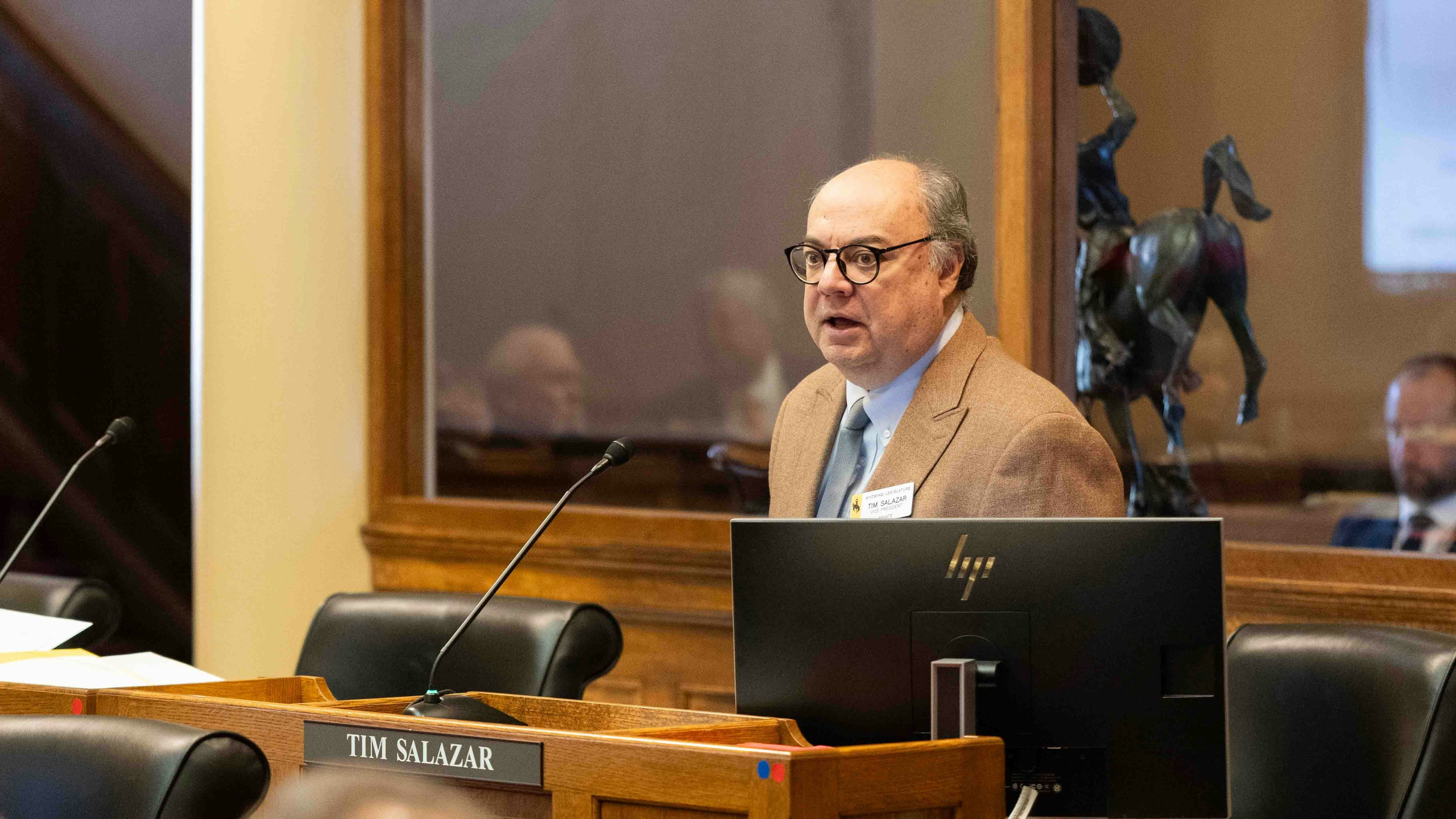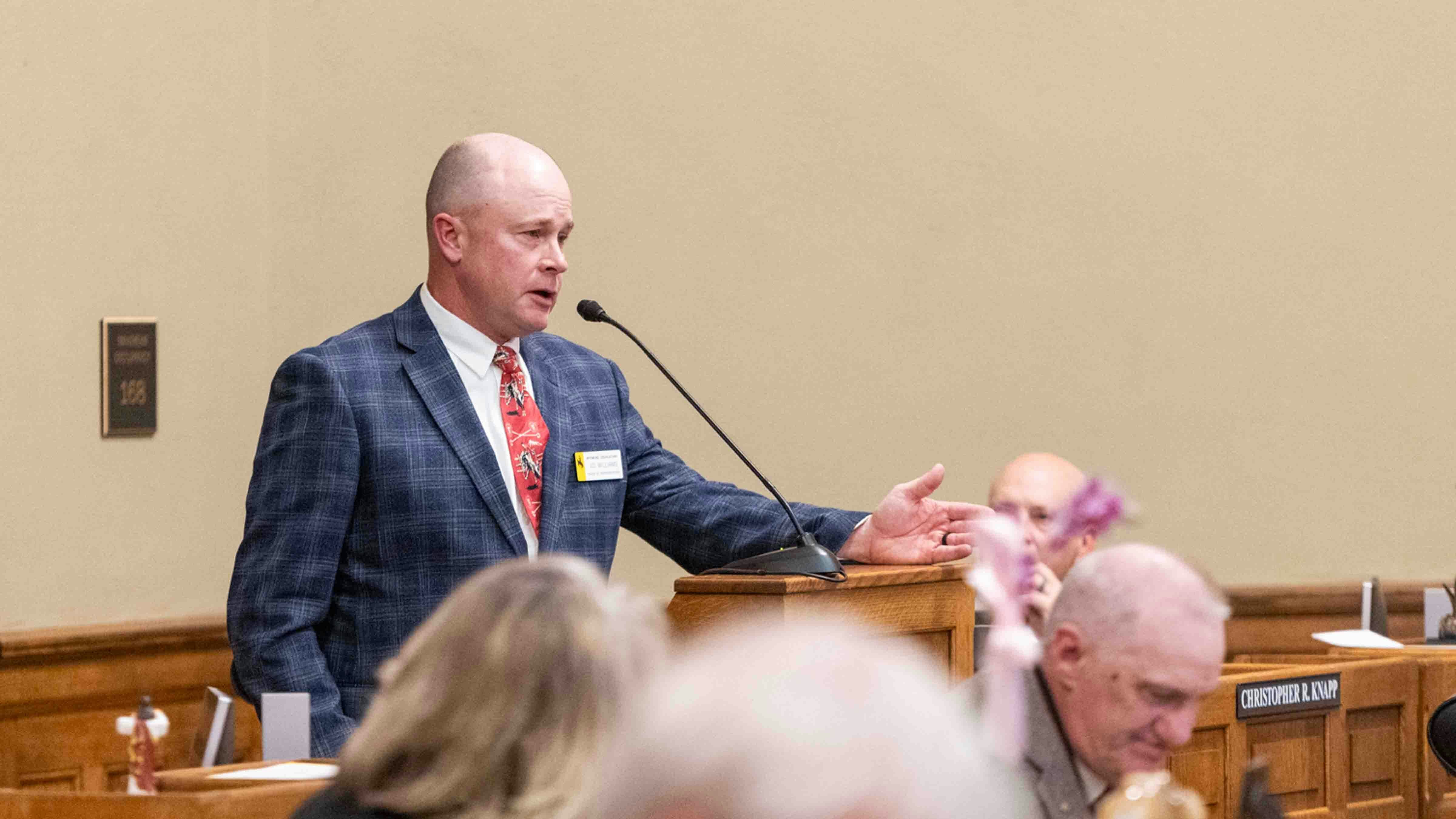The State Board of Land Commissioners on Thursday denied the renewal of six leases related to a long-contested proposal for a gravel mining operation at the base of Casper Mountain, marking a major victory for local residents who waged a 14-month battle against the development by Prism Logistics.
It represents an about-face from the board’s initial unanimous decision to approve the leases, a change in opinion that was encouraged by an army of residents and citizen scientists who brought new findings showing the threat of water and dust contamination to be greater than believed.
The hearing lasted for hours as advocates and adversaries made arguments that ranged in tone from practical to accusatory and even philosophical.
“One dollar today is sometimes better than 10 later,” said Marcy Bramlett, attorney of record for opposition group Casper Mountain Preservation Alliance (CMPA), referring to OSL’s prerogative to maximize profits on state-owned lands for the school’s trust fund.
“But it doesn't matter if you don't have clean water to drink or a land on which to walk, or a home,” she said. “To deplete that in the service of a purely economic goal, I believe, is not serving the greater fiduciary duty.”
It’s the latest in a protracted saga that’s pitted residents, developers, county and state government at odds, enmeshing all parties in a legal fight in state district court.
The OSL board is made up of Gov. Mark Gordon, Secretary of State Chuck Gray, Superintendent Megan Degenfelder, Treasurer Curt Meier and State Auditor Kristi Racines.
Coal Port Comparison
Meier was the sole dissenting voice in the 3-1 vote to deny the leases. Gordon declined to vote.
He gave an impassioned retort and lamented the denial as a threat to constitutional principles, an abdication of the board's fiduciary responsibility and a risk to state cohesion.
He held forth on the threat posed by quasi-minority rule, citing Wyoming's attempt in previous years to build a coal export facility in a small county in Washington state. That project could have brought in significant revenue for industry and state coffers, he explained, but officials there squashed the project in response to local opposition.
“All their concerns could have been mitigated, but they stopped it in its tracks and it cost our taxpayers $40 million to $60 million a year, because of people [who made] the same decision people in Natrona County made, and that evidently this board is making,” said Meier, expressing worry that the board’s no vote would foster a problematic standard.
“You figure maybe 25% of the people of Natrona County are making decisions not only for Natrona County, but for the whole state,” he said.
Vocal Opposition
Most of the dissent was aired by local residents as Thursday’s hearing laid bare the gulf that’s developed between the company and the community, with each accusing the other of acting in bad faith.
Following concerns raised by residents in early 2024, an investigation by OSL in partnership with Wyoming DEQ determined the company had violated its initial “license to explore” by excavating a site 167 feet from a stream — a breach of stipulation requiring a 300 foot buffer from all streams and lakes.
“That ties directly to the rules that apply here, which give this board discretion to not renew a lease if or to not grant one if [an applicant] has a prior history of not complying with either rules or other regulations,” said Bramlett.
The lease was put into default following the violation; however, by performing reclamation on the violated area the lease was returned to standing, per DEQ rules. But it’s a blemish the company continues to carry.
Jim Gunderson, one of 20,000 people who signed a petition to block the gravel mine, doubled down on this point.
“The best predictor of future behavior is past behavior. It is highly probable that violations will continue if this is to be allowed,” he said, leaning on his credentials as a behavioral psychologist.
Unjustified Worries
Kyle True, CEO of Prism Logistics, offered a different perspective.
“A year ago at this meeting in Casper, one of the founders and directors of the Casper Mountain Preservation Alliance … got up and [talked] about principles such as listening, seeking to understand and working to compromise,” True said. “They have wholeheartedly and firmly refused to meet with us since then.”
He went on to characterize the community’s concerns as similar to his own childhood fear of sharks in Alcova Reservoir.
“Conversation has to be a two-way item. I'm sorry, I apologize, but I don't think that's possible,” True said.
Superintendent Degenfelder said she was unconvinced by the company’s economic projections and also was compelled to vote against the renewal because of potential water concerns.
CMPA was able to show that as many as 15 proposed excavation areas were within 300 feet of streams and creeks.
Racines said she was impressed by the level of community involvement in Casper.
“My guess is some of you have probably learned a lot from this process, like, ‘Oh man, anything could end up there. I better care,’” she said, while also offering a bit of caution.
“A gravel mine is not the last thing that will be proposed on this set of state lands,” she said. “And I hope you don’t go away and say, ‘We got rid of that gravel pit so we won,’ because as long as these are state lands, they’re up for anybody to bring any proposal at any time.”
Governor Gordon offered a counter to the claims that a company like Prism could not be trusted because of the violation.
“Who of us can cast that stone. There’s an appropriate value in being able to say there is a process for cure, and if that cure process is executed, then it’s OK,” he said. “I’m optimistic about engagement. And I hate these binary choices. We’re all for it or we're all against it. Very little of what we do is in that binary space.”
Zakary Sonntag can be reached at zakary@cowboystatedaily.com.





